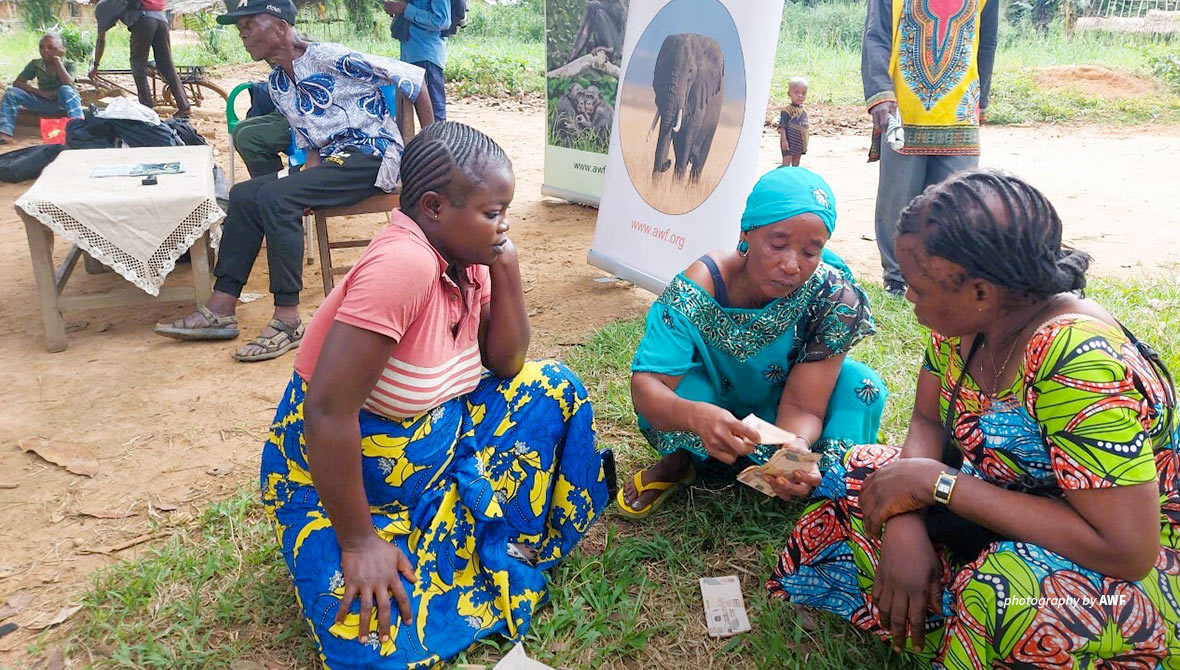A woman chief in DRC leads community conservation for local development

AWF supports women in the Democratic Republic of Congo to start conservation-friendly micro-enterprises
The Democratic Republic of Congo’s National Community Conservation Strategy cements the role of local communities living around — and sometimes inside — protected areas as essential for maintaining the integrity of the country’s critical natural landscapes. Involving local communities is a major priority for the Institut Congolais pour la Conservation de la Nature (ICCN) as the authority strives to conserve fragile ecosystems and critically endangered species amid a magnitude of threats.
“There is no conservation without local communities. Addressing their survival needs through a landscape approach paves the way for all our efforts to ensure that wildlife and wild lands thrive in a modern Africa,” said Antoine Tabu, DRC Country Coordinator. Since 2004, AWF has been operating in the DRC, working side by side with local groups in Maringa-Lopori-Wamba (MLW), a 74,000-sq.-kilometer landscape with two protected areas: the Lomako Yokokala Faunal Reserve, created in 2006, and the Iyondji Bonobo Community Reserve, created in 2011.
In both landscapes, AWF works with local stakeholders and national agencies, such as ICCN, to develop and formalize long-term conservation management and grow the local economy through sustainable use of natural resources. AWF also works with provincial governments to include the protected areas in regional development strategies to ensure political commitment and facilitate equitable resource distribution. Additionally, AWF supports the ICCN in strengthening anti-poaching operations, wildlife law enforcement, and ecological monitoring in the landscape.
“AWF’s work with ICCN in the Lomako Yokokala Wildlife Reserve aims to achieve the overall goal of building capacity for bonobo conservation and empowering local communities in the Lomako Yokokala Wildlife Reserve in the Democratic Republic of Congo,” said Idriss Ayaya, AWF Technical Advisor in Lomako.
Having understood the value of nature conservation, the local community living within this protected area increasingly supports conservation actions, mainly through local governance. AWF sensitizes local communities through regular meetings. Each sector in the landscape is represented by chiefs who engage directly with their group members and conservation partners. In addition, along with Village Entreprise, we offer microgrants across sectors to enable communities to start income-generating micro-enterprises, diverting them from illegal and unsustainable activities, such as hunting and logging, while contributing to local development.
“The local authorities are mainly on the side of conservation, but the chief who doesn’t leave anyone indifferent is Nadine, head of the Boyela group in the Lomako sector. This young woman is committed to the development actions of her entity, she maintains a good relationship with the neighboring communities and partners, but above all, she is not conflictive and encourages her community to support nature conservation,” says Idriss Ayaya.
Chief Nadine: Woman leader championing conservation and sustainable development
Bolumbu Basanga Nadine has been heading the group for 11 years. The 32-year-old succeeded to the seat after her father’s death in 2012, against all expectations of her family members. They anticipated her father to appoint his eldest child in his place.

Bolumbu Basanga Nadine is the chief of the Lomako sector and leads community conservation efforts
“I still remember the controversy as if it were yesterday. The former head of the Boyela group, Roger Basanga, had three wives and ten children. After his death, he designated Nadine, the seventh child born to the third wife, as successor to the throne. Her brothers disagreed, not only because of her gender but also because her age disqualified her. Fortunately, the whole family resolved to respect her father’s last wishes,” recounted Albert Ifasso, ICCN eco-guard and head of the Lomako sector.
“She grew up brave, full of principles, respectful, determined, and above all, united. I am more than convinced that these qualities led her father to designate her as his successor to the throne,” he continued.
Chief Nadine has put her innate skills at the service of her community, not only to consolidate her power but also to promote nature conservation and thus distinguish her sector from all the others surrounding the Lomako Yokokala Wildlife Reserve.
“For more than 10 years, the local community of the Boyela group has never been identified as a threat to conservation. No poacher from this area has ever been recorded in our database, which is something to be encouraged. If all the other chiefs were as persuasive as Nadine, poaching would be a thing of the past in the reserve,” says Gentil Kisangani, Lomako Yokokala Wildlife Reserve site manager.
“I don’t have superpowers as some people may think. I’m just lucky to have a big round table behind me that supports my ideals, gives me advice and support, and makes me a good spokesperson to the Boyela community,” said Chief Nadine.
She testified that her ancestors have always supported the conservation of nature. After taking up the responsibility, her struggle was not to establish rules but to ensure the perpetuation of good habits.
She contributes to the joint efforts of ICCN and AWF in the Lomako Yokokala Wildlife Reserve to ensure that the community of Boyela takes part in the organized pro-conservation activities, conscientiously applies the instructions given, and adopts new techniques shared during the sensitization meetings. Promoting community development and safeguarding the integrity of the reserve's biodiversity is paramount. “We only have this forest and nothing else. Destroying it is suicidal for our generation and those to come,” warned the chief.
Chief Nadine is a leader who motivates the local community to respect women, using her position to open her constituents to a global vision of sustainable development while safeguarding the rainforest as an ancestral heritage for her community, country, and continent.
“I don’t victimize myself and i would never do it. I rule over men and women without being inferiorly or superiorly complexed because intelligence and wisdom have no gender, it is the fruit of the soul. And as I was lucky enough to be born with this soul full of wisdom, I don’t waste any moment to make the local community of Boyela benefit from it,” says Chief Nadine authoritatively.
She is a mother of four children — one boy and three girls — and struggles daily to establish a balance to manage her responsibilities. “In a remote area where the level of education is low, Nadine’s leadership is worth a school for our children. They have an example to follow,” says Ikala Bontutu Michelle, head of the Songomboyo group.
AWF works with Village Enterprise in this landscape to empower the local community by providing microgrants and enterprise training to small business owners. With people-centered initiatives and pro-conservation leaders like Chief Nadine to motivate others to prioritize the protection of the Lomako Yokokala Wildlife Reserve, securing a haven for bonobos, forest elephants, and so many other endangered wildlife species.
> Learn how AWF supports the conservation of endangered bonobos in DRC